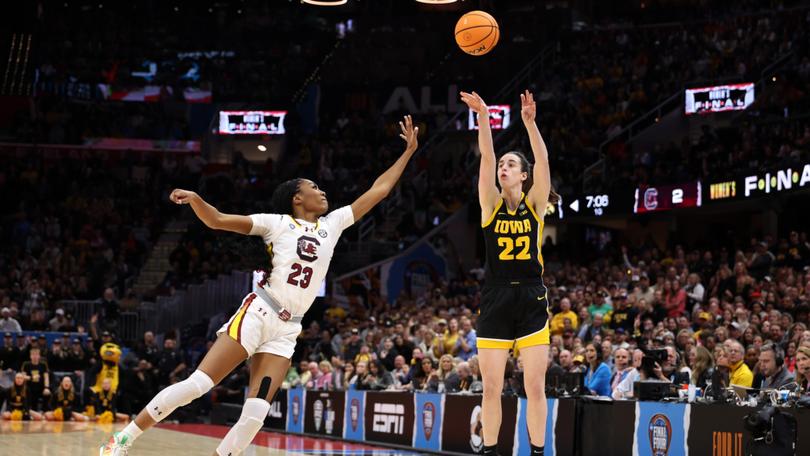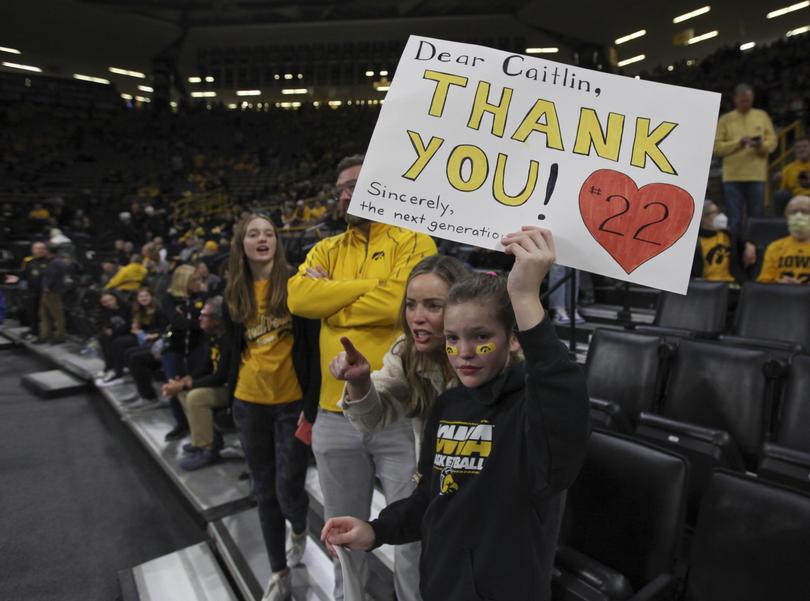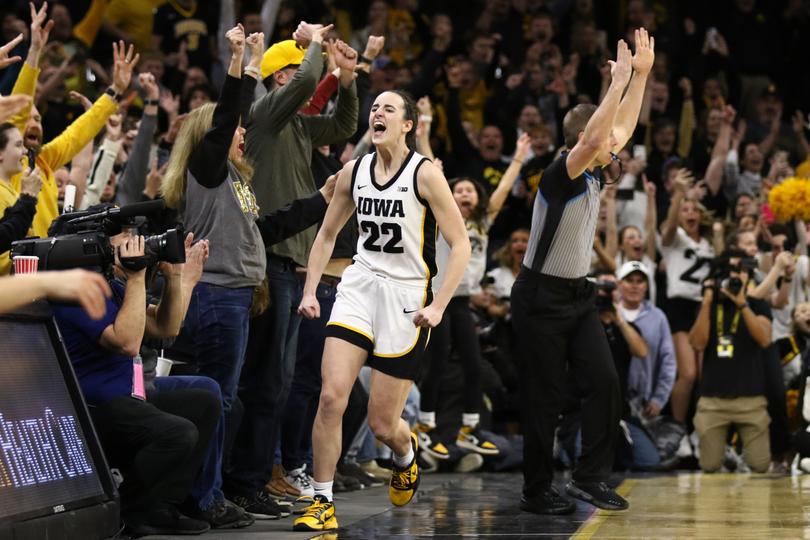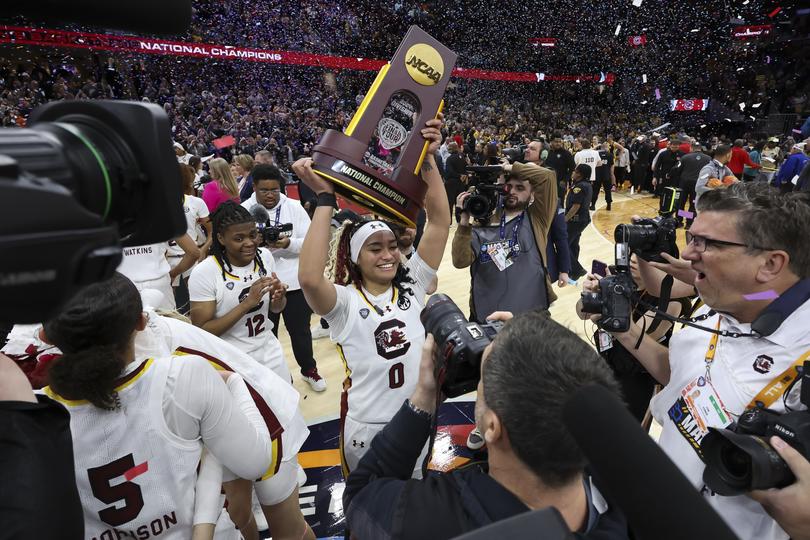Caitlin Clark: The US superstar basketballer who inspired a generation with her insane abilities on court
She changed everything about college basketball for women and what it means to be an American hero. While Clark did not bow out a champion her impact on the sport was in no way diminished.

If the hair did not raise up on your neck, if something in your chest did not swell, you were insensate. This was a game that, for all the divided loyalties and warring ambitions between South Carolina and Iowa, offered something that binds. It was decades in the thankless making for women’s basketball, so when the acclamation finally came pouring down like the clouds of confetti Sunday afternoon, it seemed fitting that the champion cutting down the net was a pioneering coach in Dawn Staley, whose tremendous Gamecocks held off the NCAA Division I all-time scoring leader in the rightly celebrated Caitlin Clark, 87-75, to finish 38-0.
For Staley, it was her third championship as a coach and her second in three years, her team amassing a remarkable record of 109-3 over that span. “This is uncommon favor,” Staley said after throwing her arms wide to catch the paper rain. As Iowa Coach Lisa Bluder said, “She’s the leader of women’s basketball right now.”
A five-point contest with four minutes to go, with Iowa’s top-scoring offense and the rivetingly imaginative Clark facing unbeaten South Carolina? Oh, yes, please. It began in a blitz of flashing lights, with school flags waving as big as medieval banners and a pandemoniac noise that steadily built to the top of Rocket Mortgage FieldHouse. It got even louder when Clark dropped 18 points in the first quarter, ripping the nets like silk. It was a classic atmosphere - and the peak of a transformative season in which the audience built by millions, thanks largely to the logo-distance shot-making of Clark, who led all scorers as usual with 30 points Sunday but suffered heartbreak in the championship game for a second straight year.
Sign up to The Nightly's newsletters.
Get the first look at the digital newspaper, curated daily stories and breaking headlines delivered to your inbox.
By continuing you agree to our Terms and Privacy Policy.
“I want to personally thank Caitlin Clark for lifting up our sport,” Staley said, an expression that showed how much the building of the women’s game, after years of disrespect and underselling, remains a joint enterprise. “She carried a heavy load for our sport, and it’s not going to stop here.”
Sunday’s seats went for an average of $718, with the most expensive at $7,000. On the eve of the game, the cold open on “Saturday Night Live” was a skit in which mock commentators such as Charles Barkley couldn’t think of the name of a single male player, only interested in the women’s tournament. During a weather delay of a Major League Baseball game at Wrigley Field on Sunday, the women’s title game was shown on the field’s giant screen.
“This team came along at a really good time,” a tearful Clark said after her final college game. Her legacy, she hoped, was that women’s sports would continue on a path toward equal popularity with men’s sports. “Believe in them the same; invest in them the same,” she said.
Her request was justified by the ratings. Last year’s championship game between LSU and Iowa, watched by 9.9 million, now seems like a mere teaser. It was overwhelmed by the 14.2 million who watched Iowa’s semifinal victory over Connecticut on Friday night, with a peak of 17 million. As Huskies Coach Geno Auriemma said: “It’s a moment, like people are saying, but it’s more than a moment, you know? Sometimes moments become minutes, and minutes become hours, and hours become days. And the next thing you know, it becomes part of the national pastime.”
Part of the allure of this occasion was that both teams bred passionate audiences with four years of team building, which gave them a familiarity and affection that the one-and-done talents in the men’s game don’t always have. When the exposure came, it met chemistry. Clark and close friend and fellow guard Kate Martin were starting their 139th straight game together, and they could lead their teammates with a look of the eyes and a flick of the ball. “They were a formidable opponent, and it took everything we had,” Staley said. Both teams were aesthetically pleasing: The game was decided by made shots, not misses. Iowa hit 39.7 percent, while South Carolina hit on a dazzling 47.9 percent.
Women’s basketball has had previous peaks - 11.8 million watched the 1983 final between Cheryl Miller’s Southern California and Kim Mulkey’s Louisiana Tech. The epic Tennessee and Connecticut rivalry, combining for 16 championships from 1995 to 2016, was must-see viewing and regularly commanded large audiences. But between the big Final Fours, there were flats and troughs. The pleas from coaches and players that they were engaging in something extraordinary went ignored by male network execs, commentators and NCAA apparatchiks who didn’t believe them - and didn’t pause long enough to pay real attention or much money.
The coaches in this game therefore had a sense not so much of a breakthrough as a kind of justice long denied. “I think the world has caught on to what they’ve been missing,” Bluder said this past week.

So many of those millions of eyes were commanded by Clark, who came into the game with a slew of records and finished with 3,951 career points. “There are thousands of boys and girls out shooting and wanting to be number 22,” Bluder said, pointedly emphasizing the boys. “Now, hopefully they won’t start with logo threes. Hopefully they’ll start with something a little bit closer.”
Perhaps Clark’s biggest asset was her ability to shoulder it all with such poise. No occasion seemed too big for her, no shot too deep. Some of her composure came from plain sense. “There’s going to be good games; there’s going to be bad games,” she said. “But I still have to be somebody that my team can lean on in those moments.” In the face of South Carolina’s long, tentacled defence, she remained loose, with a swing in her step that made that skein of dark hair sway like a pendulum. “I think the way that Caitlin has handled this has been almost textbook on how to manage outside expectations,” Bluder said. There was no question, too, that a lot of credit had to go to Bluder, whose other four starters were unsung role players. “We talk about Caitlin so much, and we love her to death, but she only has one locker,” Bluder said.
Nevertheless, the product of that one locker was utterly unprecedented in college basketball. In addition to her 3,951 points, she also had 1,144 assists, more than any man. Even when Clark wasn’t scoring, she accounted for a huge portion of her team’s effectiveness with her court vision and sleight-of-hand passing.
Clark is the only top scorer, man or woman, in the history of the college game to also be among the top three in assists. It’s an utterly unique accomplishment. No other great is anywhere near her. Pete Maravich? He didn’t even have half her assists, with 425 in three seasons. Larry Bird, with his 2,850 points? He had 435 in three years.
The conventional wisdom was that, to be considered a GOAT - a greatest of all time - Clark had to be ratified by a championship ring. It was an injustice, given all of her other accomplishments.
“I’ve played basketball at this university for four years, and for it to come down to two games and that be whether or not I’m proud of myself and proud of the way I’ve carried myself and proud of the way I’ve impacted people in their lives, I don’t think that’s a fair assessment,” Clark said Saturday. “ … I don’t want my legacy to be, ‘Oh, Caitlin won X amount of games’ or ‘Caitlin scored X amount of points.’ I hope it’s what I was able to do for the game of women’s basketball.”

It was Clark’s fate to meet another great in this game: Staley, the Philadelphia native and former Olympian who is on a run for the ages, having brought her second undefeated team to a Final Four in as many seasons. But Staley’s job wasn’t as easy or as dominant as it looked. She spent this season trying to reconstitute a team that lost all five starters to the WNBA draft. She replaced them with younger players who initially drove her crazy with their lateness to meetings, their uneven habits, their wandering attention. “I had to lay down my religion a few times at halftime,” she said earlier in the week.
But Staley developed discipline and depth at every position, aided by 6-foot-7 senior Kamilla Cardoso, who ruled the post. Staley’s freshmen learned the lesson: Tessa Johnson was the Gamecocks’ leading scorer Sunday with 19 points.
“I don’t look at wins and losses,” Staley said Saturday. “I look at how things are executed and allow the wins or the losses to take care of themselves. And as much as you bring up an undefeated season, it doesn’t feel like it because we’ve played some bad basketball that made it feel like we lost. So it’s those kinds of moments that keep us just locked into the task at hand of playing - just trying to play great basketball, just trying to make great decisions out there to increase our chances of winning.”
By the day before the championship game, Staley had shaped her team into a complete one, a model of consistency, with scoring threats all over the floor and a dominant defence. When she led the Gamecocks through a pregame film session, “It wasn’t day care this morning,” she said proudly.
There was no question Staley was the steadying difference maker for her young team in the critical moments. Over the final five minutes, South Carolina was physically imposing and also efficient, the Gamecocks steadily drawing away with the help of 48 points in the paint and 51 rebounds, 18 of them on the offensive glass. “You have a team full of players who probably felt the lead dwindle to a point where, [with] someone like Caitlin, a five-point lead versus Iowa is nothing,” Staley said. But “they don’t flinch.” Thanks to her.
Another title was a legacy maker of its own, vaulting Staley into very rare air, only the fifth coach to win three championships, joining the illustrious company of Auriemma, Pat Summitt, Kim Mulkey and Tara VanDerveer, the greatest names in the game’s history.
“We do our part in making sure we try to, as much as possible, shout it to the top of our lungs what our game is all about,” Staley said, “and all of the storylines and all the talent and all the coaches and all the talent that’s telling those stories.”
